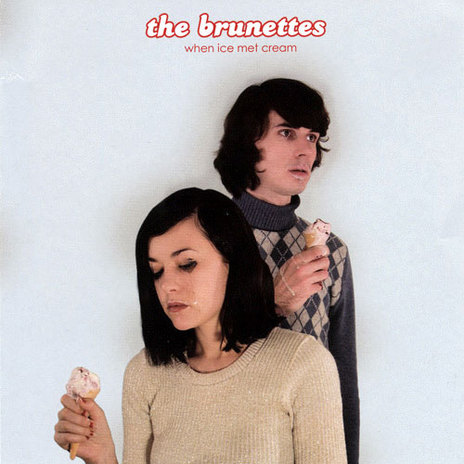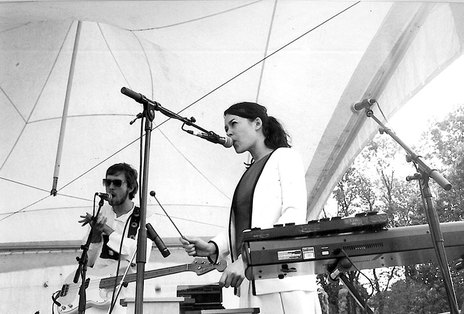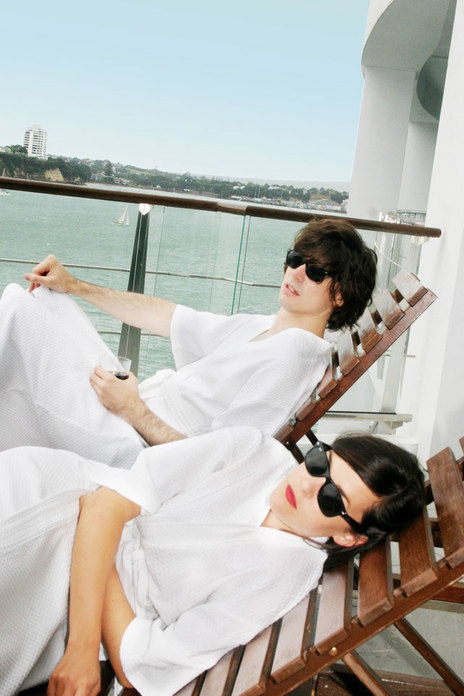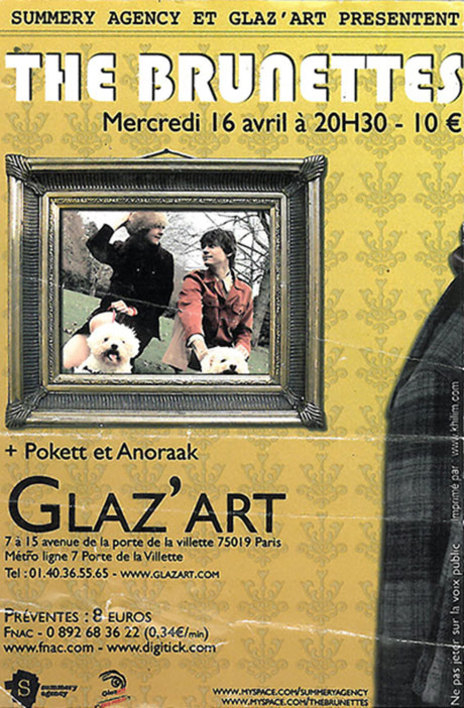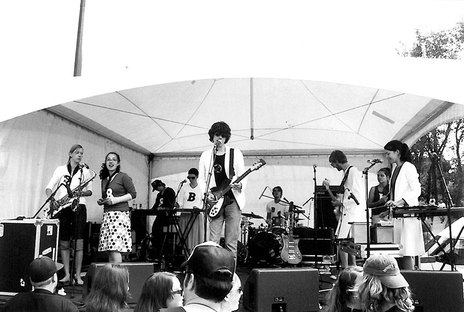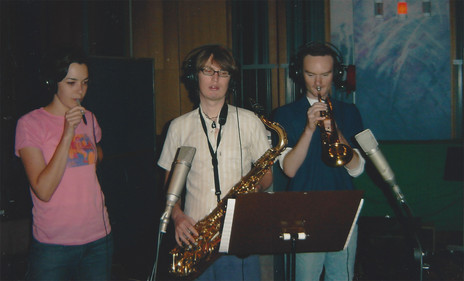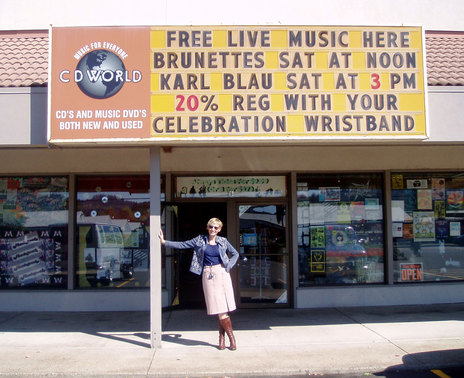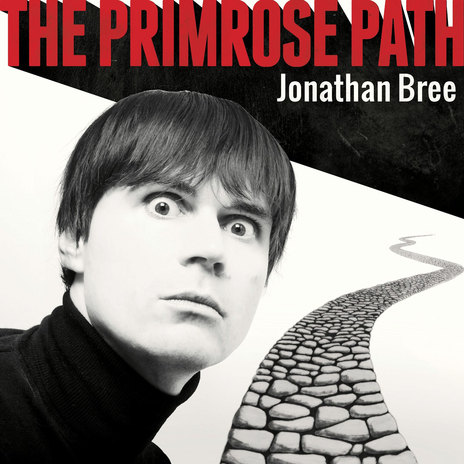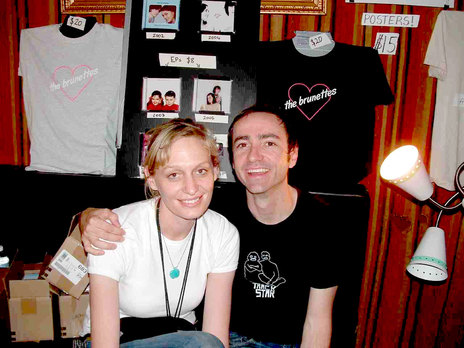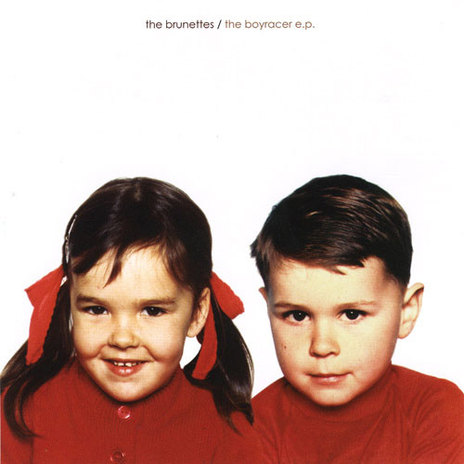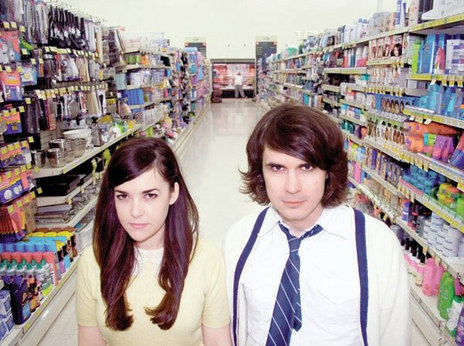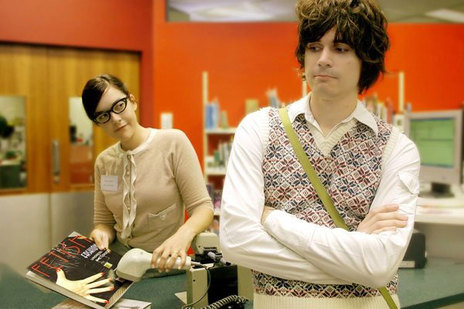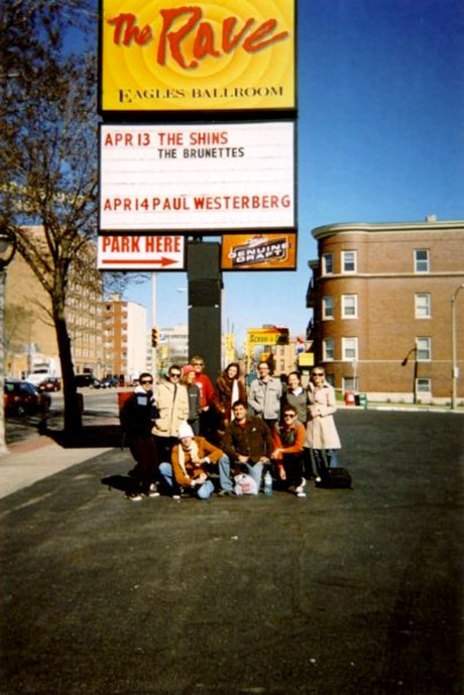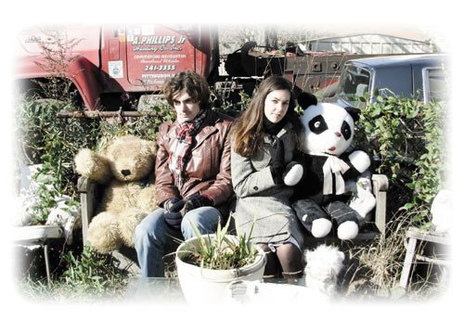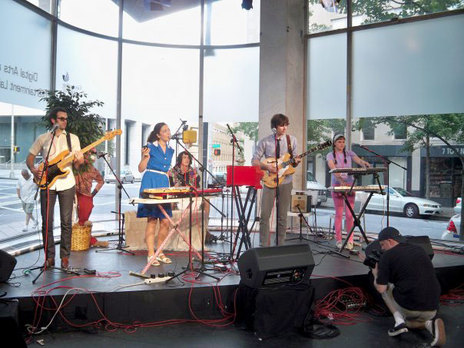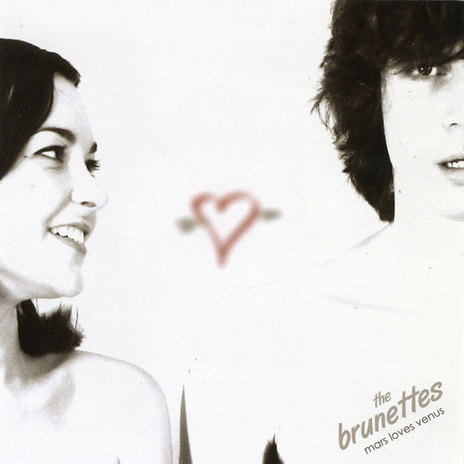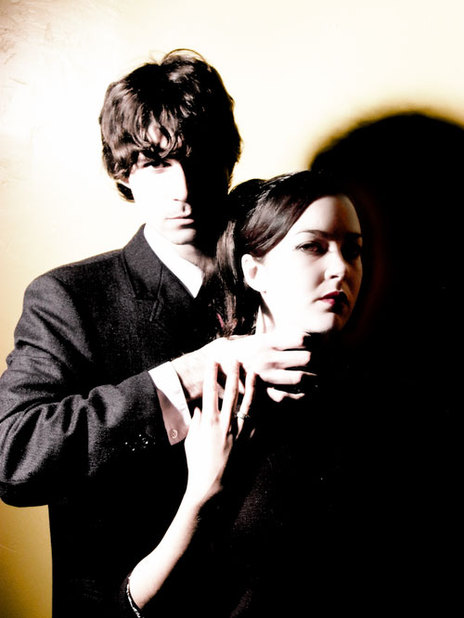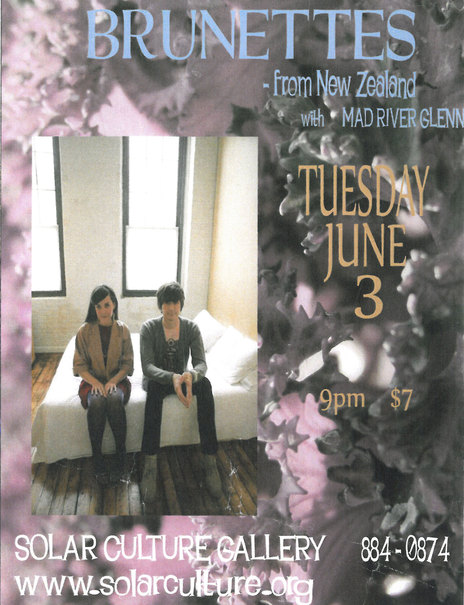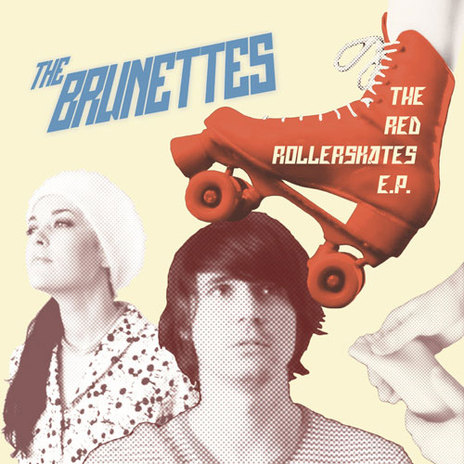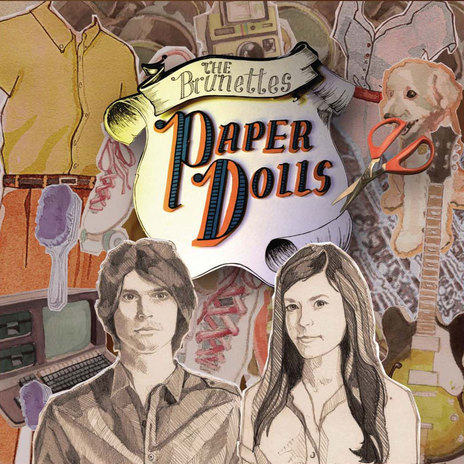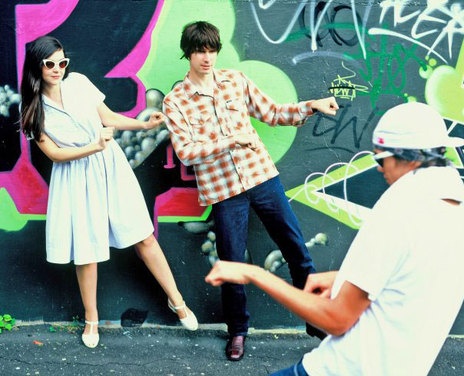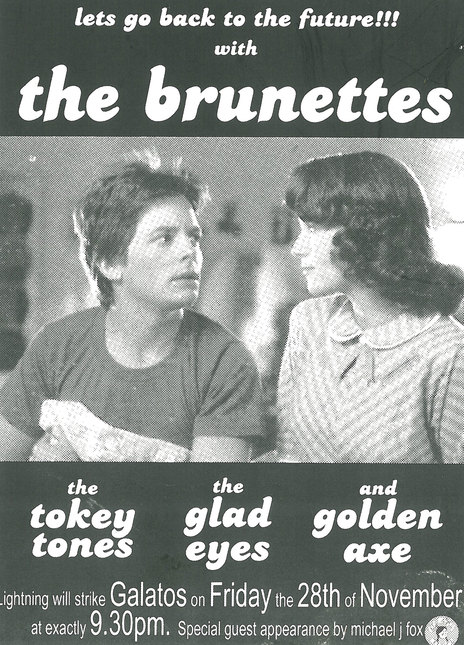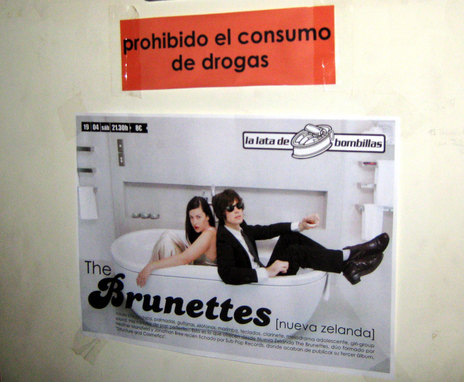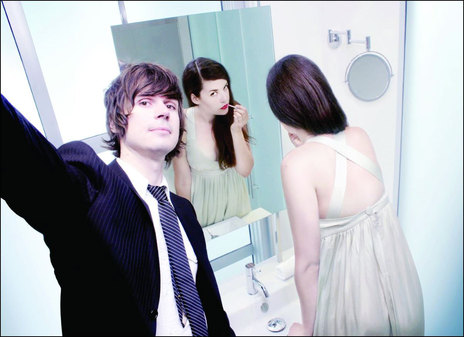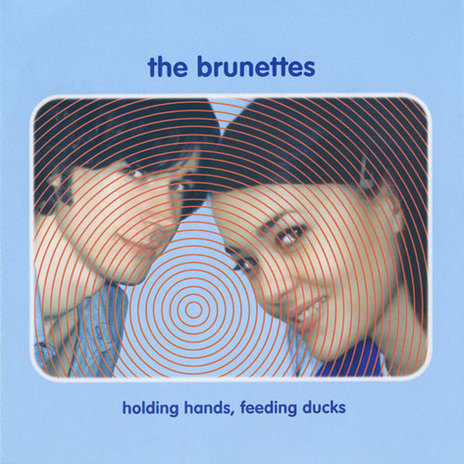Jonathan Bree was nine years old when his older cousin, Mark Lyons, decided to teach him an instrument so he’d have someone to play music with at family gatherings. Bree's fingers proved too small for guitar and bass, so he took up the drums instead. By age 12, he was playing at The Gluepot with his cousin’s newly established band, The Plaster Saints.
It wasn’t long before Bree was more excited to sit by the radio and find out whether the band had made the 95bFM Top 10 than he was by anything he learnt at school, and he recalls his mother wasn’t impressed.
“There was a big drama about where my future was heading – hanging out at bars at 12, trying to look like Robert Smith and thinking I was really cool in my goth band. So I was sent to live with my father in Australia. Attending a private boys’ school to try and straighten me out from my dreams of signing to Flying Nun was the plan. Instead, we moved to Byron Bay where my father basically started up a cult. We moved into a large events centre there and after everyone was told to stop eating to raise their vibrations so they could board the mothership, I left home at fourteen and started a succession of terrible high school bands.”
After a few years, Bree returned to New Zealand and quickly joined Lyons’ new group, The Nudie Suits, this time on bass. Bree soon left the Nudie Suits and enlisted his three flatmates to form his own group, The Brunettes, and they began playing small-scale gigs at parties and cafes including The Temple in Queen St and Roasted Addiction in Kingsland.
The beginning is nearly the end
The Brunettes began in earnest when Bree first met Heather Mansfield, whose own group, Yoko, were supporting the Nudie Suits. She was the perfect musical collaborator – a multi-instrumentalist (keyboards, clarinet), strong singer, and someone who was able to turn Bree’s ideas for the group’s image into something more stylish and captivating.
Bree had a strong interest in the orchestrated pop music of producers such as Phil Spector, Brian Wilson, and Lee Hazlewood, but his first collaborations with Mansfield took the band in a different direction. “When I first started working with Heather, she played a Juno keyboard and we were doing new wave synth-pop inspired by The Cars and Blondie. Then we somehow made friends with Celia Mancini from King Loser and they were just in the process of breaking up so we bought her Yamaha organ and our music moved further in the direction of sixties pop.”
Bree’s early experiences in professional studios were disappointing so he borrowed his cousin’s cassette 4-track and began teaching himself to record. This led to the Mars Loves Venus EP (1998), released on cassette and lathe-cut 7" vinyl. He also learnt some painful lessons in those early days of recording:
Bree realised he would have to record the entire Holding Hands, Feeding Ducks album – something he had been recording for years – again.
“I got it into my head that if I recorded tracks onto tape then transferred them to DAT then I could later take them all into a digital studio and pull out all the files. Instead of losing quality by bouncing them onto one track on the cassette, that would mean I could combine them into an end result that was sonically less degraded. But what I didn’t realise was that tape actually stretches and is very susceptible to changes in the motor speed. So I had an extremely terrible moment when we finished recording what might have been our first album, we went into a studio and put all the DAT tracks together and within one bar, they all began going out of time.”
In short, Bree realised he would have to record the entire Holding Hands, Feeding Ducks album – something he had been recording for years – again.
It was around this time that Bree was working six days a week at Auckland record store Marbecks so he could save up and buy gear for the band. Bree and Mansfield’s personal relationship was at a tense point, they were no longer functioning as a couple.
The combined stress on Bree’s shoulders pushed him to his lowest ebb: “I guess for me I never had any backup plan or safety net. I’d been living on my own since I was 14 and had decided to be a musician. I didn’t graduate from high school or go to university and I didn’t have a plan B.”
Every good band needs a manager
Thankfully soon after this, a ray of light entered Bree and Mansfield’s life in the form of Melinda Olykan. “She heard a 4-track demo of the song ‘Talk to Jesus’ that was on bFM and contacted us to get a copy of it. She told me that she worked as a booking agent for the St James theatre so I asked her to manage us – she was reluctant, but I was very persistent! Then I found out she was religious and I became paranoid that she thought we were as well. I started telling people not to swear when we had band meetings and keep it ambiguous about whether we believed in god or not because I didn’t want her to lose interest. Thankfully, it was eventually established that it wasn’t why she was helping us out.”
The Brunettes gained a more solid line-up with the addition of drummer Kari Hammond and bassist Mike Hall (previously the lead singer of hardcore band, Balance). Hammond owned a 16-track reel-to-reel recorder and this allowed the band to resume work on their first album.
Bree had by this time re-recorded sessions for their debut album in his apartment in St Kevin’s Arcade but was struck with a problem. He didn’t have access to a mixing desk that was large enough to hear all 16 tracks at one time. However, he got talking to another local musician, Scott Mannion (from Polaar and Plasticene) who said he had an early home version of Pro Tools that Bree could use.
Lil Chief Records
After struggling to find a label to release The Brunettes’ debut album, Bree joined with Mannion to release it themselves. “Scott and I decided we would start Lil’ Chief Records, which would also give us better control over how we were marketed. Our friend Lawrence Mikkelsen also helped us get it off the ground and he’s been a great supporter of the label since then.
“We were on the eve of releasing the album when Neil Finn contacted us. After all the disappointments of the past few years, it was great to have one of the heroes of New Zealand music see merit in what we were doing. A year earlier, Heather had given him a copy of the album at the [APRA] Silver Scroll awards [where The Brunettes performed ‘Sophie’ by Goodshirt], but Neil hadn’t listened to it until he was watching Liam on a TV show and happened to see our video for ‘Moon In June Stuff’. After they played the video, the hosts discussed how we funded it ourselves and kinda took the mickey by handing around a hat to collect money for us. I guess Neil saw all this, he remembered that he had our album and ended up liking it. He decided to help us out and within a couple of weeks, we suddenly had a contract with EMI.”
The resulting album, Holding Hands, Feeding Ducks (2002) became a joint release between EMI and Lil' Chief Records.
The resulting album, Holding Hands, Feeding Ducks (2002) became a joint release between EMI and Lil’ Chief Records. The album release show at Bob Bar in DeBretts on June 28, 2002, was accompanied with the release of a colouring book that showed images of the band.
Olykan’s position at the St James allowed them to book the foyer area of the Westend Theatre for a couple of shows. On one occasion, they played inside the Westend itself and showed 1960s black-and-white films on the large screen, before appearing with a string trio at the front of cinema-seated rows of fans.
Bree found it refreshing to break away from the limitations of the local scene: “There was a seventies rock revival taking place, which in my mind was itself a healthy backlash to the techno dance music scene that was at its nasty peak. Indie pop felt like it didn’t exist in this country at the time, and that made us feel like we had to go overseas from the start. Our videos and press shots were very cutesy and played up on the duo dynamic. I did originally want the Brunettes to be more of a band, but eventually decided to play up on our point of difference by promoting ourselves as a duo.”
Another reason for presenting The Brunettes as a duo was that the band were turning over band members every year or so, with the same frustrating regularity that The Chills had also faced in their first decade of existence. Mike Hall left to join Pluto and Dimmer, so was replaced by the more rock-orientated Gerald Stuart. Then long-time drummer Kari Hammond left to join Boxcar Guitars (and later, The Bloody Souls) and was replaced by Nick Harte. Fortunately, the band did make one particularly useful semi-permanent addition over this period – James Milne (Lawrence Arabia) joined on guitar and keyboards.
The overseas gamble
Olykan believed that the band’s best chance of achieving success was to move to London, so she arranged an initial trip for the band with a run of shows in Australia on the way. Bree knew it was a big gamble:
“When we left, the only show we had was a support slot with The Datsuns at the Shepherd’s Bush Empire. The New Zealand dollar was only worth 29p so our savings only gave us enough money to last six weeks. But once we were there, Milly managed to get us a support slot with The Postal Service, which just happened to mean we played in front of Wayne Coyne from The Flaming Lips and Jonathan Poneman who owned Sub Pop Records. Jenny Lewis was in The Postal Service for that tour, so that’s also how we first met her. Still, we were pretty deflated when we got home and felt like we’d spent all our money with little to show for it. That’s when a lot of bands break up I suppose. I hadn’t even heard the word ‘twee’ until we got to London. James Milne informed me that twee was not a good tag. I always wanted to feel that there was more depth to what we were doing, but we often got pigeonholed as some cutesy, bubble-gum group. We cultivated that image to begin with, but it really became annoying.”
More departures greeted their return home – Harte left to form The Shocking Pinks and Stuart joined Deja Voodoo. In the meantime, Bree’s co-label-owner, Scott Mannion, had been approached by 19-year-old drummer, Ryan McPhun, who wanted to join Mannion’s new group The Tokey Tones. Instead, Bree was the one to respond to McPhun’s email and the young drummer ended up joining The Brunettes with only a week to learn their songs before heading over to play the Meredith Music Festival and other dates in Australia (Milne took up bass duties).
Bree had already decided that for the next album, he wanted to take a more band-centred approach and had begun work on tracks supplied by Harte and Milne. “I still had a strong aesthetic in mind, so it wasn’t much of a democracy, but I definitely wanted more band involvement. I had such a like-minded line-up of musicians that I thought it was possible, but just having a single song on an album once a year isn’t going to be enough if you’re a prolific songwriter like James Milne or Nick Harte. Then Nick left, so we dropped his song before it was even finished.”
The album, Mars Loves Venus (2004), also featured a composition written solely by Mansfield (‘These Things Take Time’) and she also took over the lead vocal on Milne's contribution (‘You Beautiful Militant’). Bree’s own songwriting had reached a new level of sharpness, stretching from the driving indie rock of ‘Polyester Meets Acetate’ through to the wry ballad, ‘Your Heart Dies’, which features the immortal lyric, “I could be as faithful as a sea horse, and if you were a marine biologist, you’d know how tender that line was.”
The album was picked up by Reverberation in Australia (the label owned by Russell “Rusty” Hopkinson, the drummer from You Am I) and The Brunettes began touring regularly across the Tasman. Bree also focused on growing the band’s local audience by creating “The Brunettes Orchestrette” – an extended version of the group that often reached up to a dozen members (hitting its high point with a 20-piece line-up for a performance at the Big Day Out).
The breakthrough
Jonathan Poneman from Sub Pop had stayed in touch with The Brunettes and visited New Zealand repeatedly, even bringing the entire staff of Sub Pop down to the South Island for a company retreat. Poneman expressed interest in the idea of promoting Lil’ Chief Records as the heart of a rebirth of indie-pop in New Zealand (essentially taking the same approach he’d taken a decade earlier with Sub Pop in Seattle, during the era of grunge).
Melinda Olykan had since quit as the band’s manager and moved to London, but when she was given the job of promoting a New Zealand tour by Sub Pop group The Shins, she arranged for The Brunettes to play support. It soon struck Bree that this was going to be a major turning point:
“Directly after our show with them, they asked us to open throughout their upcoming six-week North American tour. If there was ever a magic moment where your career takes off, that night was it for us. Of course, it’s always more gradual than what you see in a music biopic, but I remember going home feeling pretty happy, even though my girlfriend wasn’t. Though what came next was four weeks of complete headache, heartache and stress. First, we had to work out who would join us for the tour – we had to pretty much kick out half the band. Heather and I had to sort out visas for everyone and cranked up huge debt on our credit cards to make it work. It was the most stressful, but most exciting time of my career. Sub Pop helped with getting our visas and arranging our back catalogue to be pressed so we had it to sell as merch. We didn’t sign with them straight away, but that’s when we started working with them.”
Up to the last minute, the band was under incredible stress. They had slimmed down from a 14-piece to a seven-piece but with an additional soundman James Dansey, a tour manager and their instruments (including a cello), it was a very cozy tour van. Fortunately, Olykan signed back on as the group’s manager at this point – in fact, Jonathan Poneman agreed to personally help cover the band’s flight costs with the condition that she was involved with planning the trip. Nonetheless, Olykan was faced with a daunting task: “After airfares were paid for, we could afford to hire a van but little else – we were sleeping on people’s floors. We ran out of money on the way to the first support show in Minneapolis, but we made more money in merch that night than I had budgeted for the entire tour – so the short version is that the merch income was what kept us afloat for the rest of the tour.”
Mansfield’s role in the group was crucial at this point and she stood out as the star of their live shows.
Mansfield’s role in the group was crucial at this point and she stood out as the star of their live shows. She proved remarkably astute at winning over each new audience with her strong onstage charisma and her knack for a good gimmick – for example, introducing members of the band by using the sixties novelty song ‘The Name Game’ or starting dancing competitions in the audience with CDs by the band as prizes.
The tour provided a remarkable launchpad for The Brunettes, with audiences of 2,000 to 5,000 per night. Bree found that their previous meeting with Jenny Lewis also came into play. “We managed to jump on a Rilo Kiley tour immediately after The Shins one finished, so we returned to a lot of the same cities. By that stage, the audience began to recognise us – at one show, some fans had the letters of our trumpet player’s name spelt out on their shirts! Harry [Cundy] was a big hit on that tour. It was funny because his first night in the band had actually been that show at the King Arms supporting The Shins. His only music background before that was playing the trumpet at high school. By the end, he was playing the trumpet onstage with Rilo Kiley and going with Heather to parties where he met Joan Baez, Sean Penn, and the drummer from Metallica. He was a popular man by the end of 2005!”
High times, low times
Bree stayed on in LA and New York, but the excitement of living as a musician was tempered by new stresses. “There was never a time when the momentum felt more aggressive, but internally things started falling apart almost straight away. Looking back I realise that if we’d managed to stay together with a more stable line-up and become more successful then I probably would’ve turned out to be a much bigger arsehole than what I am now, so I’ve got to be thankful for that. I was turning into a bit of an egomaniac. There was far too much cocaine in the mix for rational decision making from my end. I perhaps should have gone home after those tours ended but I actually lived in the States for another six months. I guess I just wanted to stay in America a little longer ... chasing the dream.
“The band was at a peak of sorts but at the same time, there was no band. While everyone at home probably thought everything was going great for us, I was essentially homeless. At one point I had been house-sitting for a member of Rilo Kiley in LA but after realising I’d overstayed my welcome I started sleeping in a local cemetery where Sam Cooke was buried. Milly [Melinda Olykan] was horrified so she transferred a few hundred dollars into my account so I could get a shitty motel room in Pasadena until something else could be arranged. In New York, I went through a bad patch where I was sleeping on a concrete floor in a Brooklyn basement. Cats down there would piss on me every night. I remember at some point just crying because I lost my girlfriend, couldn’t sleep, had badly bruised hips and smelled like cat piss.”
A major obstacle for the band at this point was the sudden departure of both Ryan McPhun (who left to pursue his own group, The Ruby Suns) and James Milne (who started Lawrence Arabia and The Reduction Agents). Bree admits that it was unfortunate timing. “They were certainly two friends I found it very easy to work with – I could bring a very rough new composition to the group and we’d work it out as a band because whatever everyone played was always going to be great. Songs like ‘B.A.B.Y’ and ‘Mary-Kate & Ashley’ came about that way.”
The overseas onslaught
More tours followed. Stu Kett (from The Situations) joined on drums for an Australian tour supporting The Shins, along with Sjionel Timu (The Coolies) on bass and William Cotton on guitar and saxophone. Kett left before their next tour (through the US, supporting Clap Your Hands Say Yeah) and the drum seat was taken by Jamie Power from Melbourne group The Raylenes, who’d not only supported The Brunettes in Australia but written a song that was an ode to Heather Mansfield.
Bree later came to suspect that they'd ended up spending too much time on touring, at the expense of releasing new material.
Bree later came to suspect that they’d ended up spending too much time on touring, at the expense of releasing new material. “By the time we released a new album, it was two years since The Shins tour. The initial interest had subsided, even at Sub Pop to some degree. Our first US single release with Sub Pop was ‘Her Hairagami Set’ and we also made a music video, but their response to it was – ‘we can't shop this, it’s too close to Columbine’. I couldn’t understand why a label like Sub Pop would be so uneasy about it, especially in a world where there are shows like South Park and Family Guy. Why would they be so sensitive about a video that shows a puppet taking a hairdryer to school to attack someone’s hairstyle? It wasn’t graphic so I wasn’t impressed by what felt like censorship of our first US single. Funnily enough, YouTube picked it up by chance from Lil’ Chief Records channel and featured it on their main page. It got over 300,000 views in a month, which is nothing these days but seemed like a lot at the time.”
Structure and Cosmetics (2007) shed some of the cutesy aspects of previous releases by pushing the lively rhythm section playing of McPhun and Milne to the fore and showed that the band’s music was moving in a darker direction on tracks like ‘Credit Card Mail Order’ and the album’s title track. Ed Cake acted as a co-producer and co-wrote the track, ‘Stereo’. The album received a good reaction overseas, receiving a 7.3 on Pitchfork and spurring a reviewer at the NME to write: “The Brunettes have just moved the musical bar so high that unless giraffes master the Moog pretty darn soon, everyone’s just going to have to give up hope.” It also led to Heather and Jonathan appearing in an eight-page photo-shoot for Bust Magazine.
The band had finally reached the level where they could undertake their own headlining tour of the US, UK, Europe, and Australia, with a new line-up that included Stephen Hart (guitar, bass), Hayden Eastmond-Mein (saxophone, bass) and John Parker (drums).
In 2008, another tour was planned but only Parker remained from the previous line-up, so three new members were added: Edward Castelow (Dictaphone Blues) on bass and guitar, Chelsea Nikkel on saxophone and synths, and the writer of this piece, Gareth Shute, on guitar, bass, trumpet, trombone. The band were booked in to do all Laneway Festivals in Australia and then support slots with Broken Social Scene and Shout Out Louds in the UK and Europe, then another tour with Beirut in America. But a day before the band were set to leave, Sub Pop tried to pull the plug on the tour, suggesting Bree focus on recording the next album instead. When the band decided to head off regardless, it caused a further discord with their US label.
In the meantime, the band’s new single ‘Brunettes Against Bubblegum Youth (B.A.B.Y)’ had been picked up for a television ad promoting the forthcoming season of popular drama show, Hollyoaks. As soon as the band arrived in the UK, Bree began to see the potential opportunity that had been missed.
“When we were doing the support slots in the UK it seemed everyone knew that song, but not that we were the band that played it. I found it frustrating that no label support seemed to be capitalising on both our touring and the free promotion through that particular licence. I might sound like a spoiled brat but as a band, we were throwing everything at touring and promotion. It had cost many relationships and so it started to become more important that those sacrifices weren’t for nothing. When you begin to realise not even the label you signed with two years beforehand had your back, it was depressing.”
Arranging the tour was Olykan’s final involvement with the group and she left soon after to focus on work that could actually pay her bills. Before working with The Brunettes, Melinda Olykan had managed The Strange Loves (Flying Nun, 1990) and The Peter Stuyvesant Hit List (1999-2001). She continued to live in London after parting ways with The Brunettes and went on to produce an Italian Classical Music Festival for a few years that featured artists including Sophia Loren, Robert Redford, Anthony Hopkins and Sting. As a result of a nice connection with Redford, she ended up launching and producing his annual Sundance London Film and Music Festival. She is on the board of the Country Music Association (which produces Europe's only Country Music Festival Franchise “Country to Country”) and works full-time at The O2 (London) as Festivals and Events Director.
A final album, a final tour
Due to time pressure, Bree ended up working on the band’s next album, Paper Dolls (2009) whilst in the back of the tour van and this necessitated a move towards sample-based production, adding an electronic edge to the band’s sound.
Bree was hopeful that Paper Dolls might mark a new phase for the group, but instead, it became their final chapter. “We finally got a line-up together that seemed long-lasting – Heather was a lot happier on the road because she had her husband in the band [New York musician, Andrew Thompson] and I was a lot happier because I had my girlfriend Chelsea [Nikkel] with me. Plus we had John, who’d been in the band for a few years. But in the usual seesaw manner of our career, that's when things fell apart behind the scenes. 2009 was hands down the worst year ever. We had to turn down a big US tour due to financial problems and tax issues. Then once we got the money together and actually paid for flights and visas to get the band back to the US to be part of a Sub Pop showcase at South-by-Southwest, they told us two days out from us flying to Texas that they didn’t want to release Paper Dolls and immediately dropped us from the showcase. Incredibly bad timing.
“We ended up finding a new manager and organising a self-release and flew the band members to New York (flights had already been booked and paid for months before) to begin a US tour in March of 2009. But our new manager, through another series of tragic events, had a crippling mental breakdown only a few days after we arrived. Unfortunately that only happened after he’d already convinced us to sever ties with our previous booking agent, publicists and distributors, all these people we’d worked with in the past so he could bring on board his new team of people. Essentially the person pulling all the strings just dropped off the radar on the eve of us landing. At the last minute, we begged Ben Goldberg (the manager of Beirut) to help us out and he kindly agreed. Unfortunately, it turned out to be the same week he signed The Breeders. He was managing three ‘B’ bands and we were definitely the third ‘B’ on that list! So we got passed onto his two interns, one of whom happened to be Sharon Van Etten, the musician. She was great and helped get our Paper Dolls album out in the US. However, our tour that was due to start in March had to be pushed back and the whole band was stuck in New York for six months purging money before eventually securing a dismal co-headlining tour with Throw Me The Statue. When we got home, Heather and I both knew that it was time to call it quits.”
After a few final shows in New Zealand and Australia to help pay off some bad debts, the band quietly broke up.
After a few final shows in New Zealand and Australia to help pay off some bad debts, the band quietly broke up. Mansfield moved back to New York and Bree began recording music for television. He also decided it was time for him to support the music of his partner, Chelsea Nikkel since she’d toured for years in his band. As a result, he became a member of the Princess Chelsea touring band and also appeared on one of her most popular tracks, ‘The Cigarette Duet’. The accompanying music video he made for the song went on to become a viral hit – racking up around 20 million views on YouTube.
Bree eventually started his own solo career, releasing three albums and having a viral hit of his own with ‘You're So Cool’ (over 13 million Youtube views). Yet he shunned the limelight and took to wearing a mask in his videos and for live shows. “Chelsea started encouraging me to put stuff out. So I put The Primrose Path [2013] up online for free when we were halfway through a Princess Chelsea tour overseas. Perhaps once you hear the story of The Brunettes, you know why I’m so over the music industry. That’s why I very rarely do any self-promotion and interviews about my solo work – it just feels like part of an industry that already came close to killing my love of music. It just means too much to me to cheapen it too much.
“Being in The Brunettes led to me playing in front of thousands of people all over the globe. I got to see so much of the world. That was the real highlight, especially for me to be able to do that without any education – I didn’t even finish high school! I got to do it because I had Heather always there with me – she never left. It was always us together doing it. Milly was also there for most of the band’s life and when she was on board, she was always very selfless – she did so much for no pay to help us get where we were going. Even after all the drama, I’ve got that to be grateful for.”
